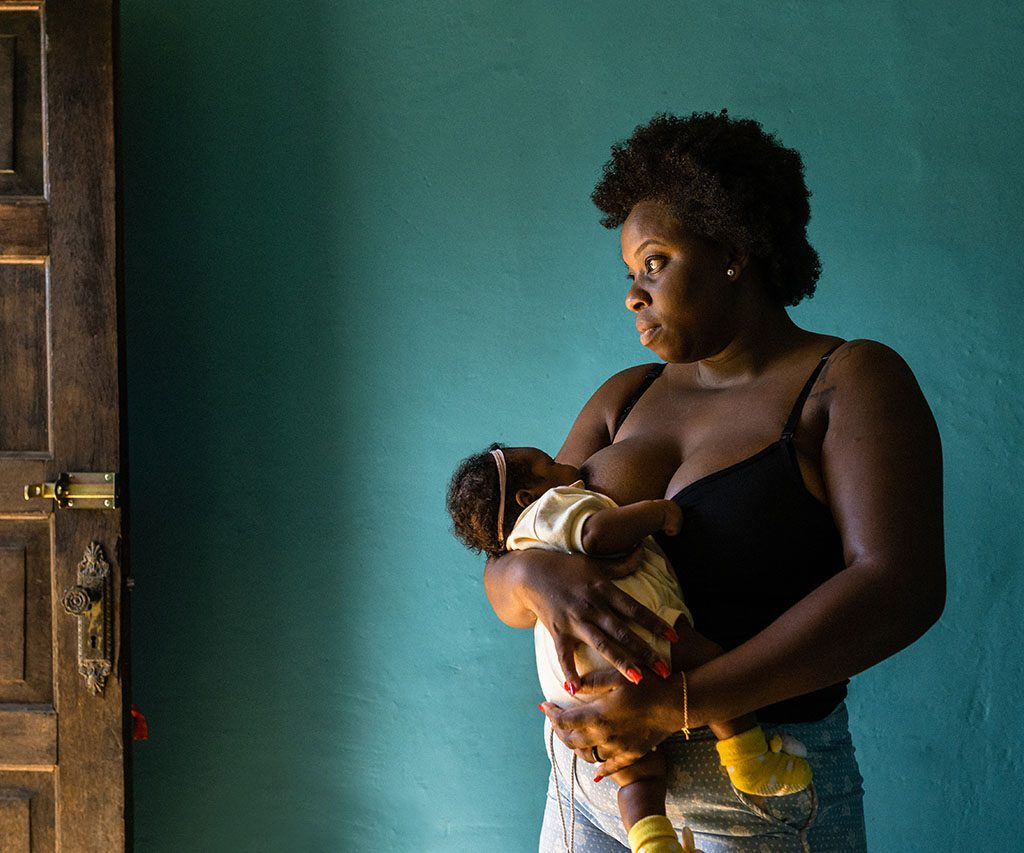It’s no coincidence that we chose to highlight our theme “Human Milk is a Human Right” during Black History Month.
Breastfeeding is Complicated
During the era of enslavement, Black women were often forced to breastfeed the offspring of their oppressors. This led to white infants benefitting from the lifelong health benefits and disease mitigating effects of human milk, while the Black infants had to miss out on many of these benefits.
The effects of this ancestral trauma can make lactation complex for Black parents, even generations later.
On top of this, the more recent effects of white supremacy culture, colonization, corporate greed, and oppression have led to modern barriers, including a disproportionate dependence on infant formula in Black and global majority communities, a lack of Black representation in lactation support circles and healthcare careers, a lack of cultural support for breastfeeding in general (and breastfeeding in public in particular), and a lack of workplace support for Black lactating parents.
For example, Black parents are 9x more likely to be offered formula after birth in comparison with white parents. Let that sink in.
Black parents are also more likely to be denied adequate maternity leave and workplace accommodations for breastfeeding. Paid leave is essential to breastfeeding success, yet Black women are disproportionately employed in industries that fail to provide it. Without paid leave, many Black parents are forced to return to work far too soon, disrupting breastfeeding and increasing reliance on formula. Hospitals in predominantly Black communities are less likely to have Baby-Friendly Hospital Initiative (BFHI) certification, which supports breastfeeding immediately after birth. Instead, formula companies have historically targeted Black families, flooding hospitals and communities with marketing that disrupts breastfeeding. This medical-industrial push for formula over human milk continues to disproportionately affect Black infants today.
But these disparities are not Black history. These examples are the history of white supremacy culture, oppression, and colonization. In other words, this is white history – and those of us who are white need to sit with that discomfort and acknowledge the harmful legacy of the systems and structures that we – and our ancestors – have benefitted from and continue to benefit from.
Even in the face of these injustices, #BlackWomenDoBreastfeed. That’s the Black history we highlight at Nurturely.
Breastfeeding is Black History
Black women are making history, redefining this complex relationship with breastfeeding and rewriting the narrative on how Black birth includes a birthright to human milk.
Recent historical milestones led by Black lactation experts and advocates include: Black Breastfeeding Week being founded in 2013 by Kimberly Seals Allers, Kiddada Green, and Anayah Sangodele-Ayoka to celebrate and advocate for Black lactation. Now, over a decade and almost 15k followers later, the movement is going strong! Chocolate Milk, a documentary by Black filmmaker Elizabeth Gray Bayne, sheds light on the resilience and challenges Black parents face in the lactation journey. We love screening the film Chocolate Milk, which continues to get rave reviews from our audience. Developed by Nekisha Killings, The Melanated Mammary Atlas serves as a critical tool for healthcare professionals, ensuring that Black bodies are accurately represented in lactation education. Nekisha is successfully integrating the MMA in university programs across the US! Meanwhile, university initiatives like the MILK Lab, led by Dr. Ifeyinwa Asiodu, continue to push for interdisciplinary approaches to lactation equity research.
Breastfeeding is Black Futures
At Nurturely, our Black and multicultural team is fighting for Lactation Equity—because human milk is a right, not a privilege. We are committed to uplifting Black leadership and investing in community-driven solutions. This includes expanding our Milk Magic Educators Program to ensure that Black and global majority community leaders are supported and equipped with the tools to provide culturally competent lactation education. We are actively working toward systemic change through initiatives like the Lactation Equity Coalition (Nurturely.org/lactation-equity-coalition), which mobilizes cross-sector leaders to dismantle barriers in lactation support. Beyond education and advocacy, we are increasing access to donor human milk through our Milk Drop Site at the Nurturely Lounge in partnership with Northwest Mother’s Milk Bank, where community members can donate donor milk for NICU babies.
Breastfeeding does not exist in a vacuum—it is deeply intertwined with racial, economic, and environmental justice. The fight for lactation equity is the fight against the same oppressive structures that deny Black communities access to quality healthcare, economic security, and environmental protections. When we talk about breastfeeding as a human right, we must acknowledge the systemic racism that has prevented Black parents from exercising that right.
When we say human milk is a human right, we are not just supporting breastfeeding, we are fighting in solidarity for health equity, racial justice, economic security, and climate resilience.
